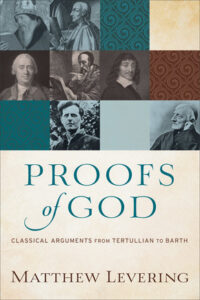
Christian Faith and Metaphysical Reason
Biblical scholar N. T. Wright observes with regard to Romans 1:19–20, “Paul clearly does believe that when humans look at creation they are aware, at some level, of the power and divinity of the creator,” so that there is a “divine selfrevelation in creation.”75  Yet, can it really be said that pagans arrived at some knowledge of the living God? Certainly, Plato’s “Maker,” Aristotle’s Pure Act, and Plotinus’s One are not the Christian God. There are simply too many differences. But when these thinkers argue for the existence of a Maker, for the existence of Pure Act as the first principle, or for the existence of the supreme One, they do in fact touch the living God. I disagree, therefore, with the position—well described by Bruce Marshall—that “while anyone can make a valid argument for an unmoved mover or first cause, only under the conditions of Christian faith can we recognize that this mover or cause is the God Christians are talking about.”76 There cannot be a God who creates and transcends everything but is not Pure Act. If there is Pure Act but the Christian God is lesser, then the Christian God is not God at all. The demonstration of Pure Act is the demonstration of God, though it is not all that needs to be said about the living God, the God of Christians.77There cannot be a God who creates and transcends everything but is not Pure Act. If there is Pure Act but the Christian God is lesser, then the Christian God is not God at all. Click To Tweet
Yet, can it really be said that pagans arrived at some knowledge of the living God? Certainly, Plato’s “Maker,” Aristotle’s Pure Act, and Plotinus’s One are not the Christian God. There are simply too many differences. But when these thinkers argue for the existence of a Maker, for the existence of Pure Act as the first principle, or for the existence of the supreme One, they do in fact touch the living God. I disagree, therefore, with the position—well described by Bruce Marshall—that “while anyone can make a valid argument for an unmoved mover or first cause, only under the conditions of Christian faith can we recognize that this mover or cause is the God Christians are talking about.”76 There cannot be a God who creates and transcends everything but is not Pure Act. If there is Pure Act but the Christian God is lesser, then the Christian God is not God at all. The demonstration of Pure Act is the demonstration of God, though it is not all that needs to be said about the living God, the God of Christians.77There cannot be a God who creates and transcends everything but is not Pure Act. If there is Pure Act but the Christian God is lesser, then the Christian God is not God at all. Click To Tweet
David Hart states matters with his customary forcefulness. Remarking that “there are many persons who object in principle to any fraternization between different religious vocabularies,” he argues that it would be churlish to suppose that knowledge of the true God’s existence is only possible for those whose minds have been healed and elevated by faith in God’s revelation of himself in Jesus Christ and the Holy Spirit.78 This seems right to me, not least as an interpretation of Wisdom 13, Romans 1, and other New Testament texts such as Acts 17 and 19. Indeed, Hart goes so far as to assert that “all the major theistic traditions claim that humanity as a whole has a knowledge of God, in some form or another, and that a perfect ignorance of God is impossible for any people.”79
Whether or not this can be substantiated for each of the major theistic traditions, it is surely what the Catholic Church teaches. After criticizing “ra rationalism or naturalism,” the First Vatican Council’s dogmatic constitution Dei Filius proclaims that “God, the source and end of all things, can be known with certainty from the consideration of created things, by the natural power of human reason.”80 Along broadly similar lines, the Second Vatican Council’s declaration Nostra Aetate states, “From ancient until modern time there is found among various peoples a certain perception of that unseen force which is pres ent in the course of things and in events in human life, and sometimes even an acknowledgement of a supreme deity or even of a Father.”81 The arguments for God’s existence arrive at selfsubsistent Act, the source of all things, the cause of order in the universe, the infinitely perfect source of all finite perfections. It is in this sense that, as Hart comments, “the God of faith and the God of the philosophers are in many crucial respects recognizably one and the same.”82
Even so, Rémi Brague voices a common opinion when he states that the per sonal and living God “is only accessible to faith.”83 Indebted to Pascal, Brague holds that God reveals himself only to those who seek knowledge of him as one would seek to know a transcendent person rather than as one would seek to know an empirical fact. This is no doubt true regarding intimate knowledge of God. But God also wills that the truth of his existence be knowable by human reason. There need be no competition between revelation and reason.84 God created our minds to stretch toward God and to know him. Of course, it is personal intimacy with God—the saving God who loves us, heals us, and draws us to union with him forever—that we most desire rather than simply demonstrative knowledge that God exists. As Albert Dondeyne observes, “The believer is not content with thinking of the world as created by a transcendent first cause; in the act of faith he cleaves to God himself, he addresses him directly, opens his heart to him as to an absolute Thou, in the hope that God will be his light, his truth and his life.”85 But the demonstration of a transcendent first cause is good too.What the proofs show is that a transcendent, infinite source of all finite things exists. Click To Tweet
It may seem, however, that by this emphasis on the demonstrations of God’s existence I am falling into the error that Michael Buckley attributes to his fellow Jesuit Leonard Lessius (1554–1623). Lessius’s De providentia numinis sought to counter Enlightenment atheism by critiquing skeptical ancient philosophers rather than by critiquing the Enlightenment denial of the divinity of Jesus Christ. Buckley observes that “atheism in the sixteenth and seventeenth centuries is treated as if it were a philosophic issue, rather than a religious one; this shift characterizes Catholic apologetics for the succeeding four hundred years.”86 Christology became “irrelevant in establishing the reality of god”; Christ’s revelation of God was displaced in the quest for certitude about God.87 According to Buckley, Lessius’s approach lasted so long because theologians forgot that the defense of God’s existence primarily requires attention to Christ and the Holy Spirit.
I agree with Buckley that metaphysical reasoning on its own, without the God who reveals himself, cannot nourish the real relationship with the living God that is the true purpose of knowing that God exists. Buckley, however, undermines the significant, though secondary, value of the demonstrations of God’s existence for the Christian tradition by his claim that “if one abrogates this [Christological and Pneumatological] evidence, one abrogates this god.”88 This would be so only if the God whose existence is demonstrable by reason were necessarily a distortion of the biblical God. In fact, as Denys Turner observes, “the proofs of God prove very little indeed, but just enough: as ‘proofs’ they fall into that class of ‘demonstrations’ which merely show that something exists by way of explanation (demonstratio quia), from which, no doubt some properties are derivable which must hold true.”89 What the proofs show is that a transcendent, infinite source of all finite things exists.
The above excerpt is from Matthew Levering, Proofs of God. Baker Academic, a division of Baker Publishing Group, © 2016. Used by permission.

